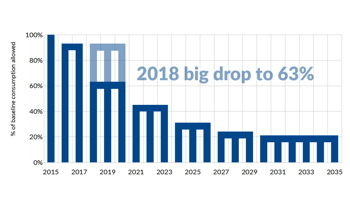Brexit presents opportunities for UK to embrace environmental standards

Dave Clayton of AirSource assesses the impact Brexit will have on environmental issues, in particular the imminent impact of regulations to phase down the use of F-gases such as HFCs as refrigerants.
The European Union, with our influence, has always set high environmental standards. With Britain’s withdrawal, we can now use our independent standing to become a global leader in the development of alternative technology.
EU regulations are at the forefront of the phase down of the use of fluorinated gases, promoting the use of lower-GWP (global-warming potential) refrigerants. This is expected to increase demand for climate-friendly technologies, creating business opportunities and accelerating innovation and economies of scale for new products. Lower-GWP refrigerants have a degree of flammability, and the HVAC industry will need to address the implications of designing systems with flammable refrigerants.
Key changes to future F-gas supplies
Reducing the use of high-GWP refrigerants such as R410A will be enforced by implementing a phase-down quota for HFCs placed on the market. The key calculation is measured in equivalent tonnes of carbon dioxide (ET CO2), which is calculated by multiplying the system charge (kg) by the refrigerant GWP/1000. This favours the use of moderate- and low-GWP refrigerants and systems with lower gas volumes — such as chilled water.
The potential is huge. The current EU517/2014 regulation introduced phase-down quotas based on the consumption in 2012, which starts in 2017 with a reduction to 95% followed by a big reduction just around the corner in 2018, with the quota of supply/consumption dropping to 63% of the base figure.
This rapid reduction could lead to price increases and shortages in the market. Refrigerant producers will be required to reduce their volume of ET CO2 to maintain their current volume of production. They will have to produce more refrigerants with moderate, low and ultra-low GWPs to maintain volumes or increase prices on lower outputs to maintain profit.
Communicating the EU message on the implications of the phase-down of HFC refrigerants to the HVAC industry has got off to a slow start; so far it has only got as far as the refrigerant producer, the compressor manufacturer and the equipment manufacturer. Distributers and contractors will have to consider the risks of ignoring the phase-down implication with its possible cost increases and shortage of supply, especially with large long-term projects. We have already witnessed the large multinationals responding to developments by acquiring or partnering manufacturing companies with water-based cooling equipment.
In general terms, a manufacturer, designer, contractor or distributor currently dependent on R410A systems or other high-GWP refrigerants, may find that proportion of business reducing to 63% in volume in 2018 if they do not take action or advantage of currently available low-GWP products.

So where do we stand after Brexit?
The phase down of high-GWP refrigerants is coming up fast, and current implementation in the UK will not be affected or reduced by our exit from the EU. Most of our supplies of equipment and refrigerant come from within Europe anyway, which keeps us tied in with the current phase-down structure across the EU. The current version of regulation EU517/2014 has already been incorporated into UK law.
It may be in our interest to accelerate the phase-down process in the UK to demonstrate our commitment to the cause, regardless of the Brexit vote outcome, to retain our influence and involvement on future policy at the highest level.
The UK has always played a pivotal role in embracing the policies and the latest technologies. We were the first country in the world to install a water chiller operating with an ultra-low GWP refrigerant R1234ze.
We need to formulate our own plan and direction with clarity on actions and timescales, increasing the awareness of the phase down, the move towards flammable refrigerants and lower ET CO2. There are products presently available on the market operating with refrigerants R32, R1234ze, R290 and CO2, which should be utilised if suitable for your application.
I really believe that the UK, if industry seizes this opportunity and makes the right moves over the next couple of years, can be a world leader on our own. Through a demonstrable commitment to enhancing environmental policy, we can help accelerate innovation and business opportunities, claiming our place at the head of the table.
Dave Clayton is managing director of AirSource.







